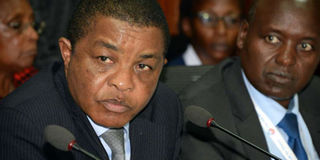10 KRA officials face probe over Sh2.5 billion tax evasion

Kenya Revenue Authority Commissioner General John Njiraini (left) and Commissioner Ezekiel Saina during an appearance before the Public Investment Committee on March 29, 2018 at Parliament Buildings in Nairobi County. The authority has agreed to an out-of-court settlement with sugar importer Darasa Investment Limited. PHOTO | SALATON NJAU | NATION MEDIA GROUP
What you need to know:
During the court case, some KRA officials were concerned that Darasa Investment had insider information in its bid to evade paying Sh2.5 billion tax.
The investigations will be of public interest since it goes into the integrity of an agency entrusted with revenue collection for the national government.
It might also shed light into how KRA officials and employees collude with companies to evade tax.
The Ethics and Anti-Corruption Commission is investigating 10 senior Kenya Revenue Authority officials, who include two commissioners, over their possible flirtation with a company that was recently ordered by Court of Appeal to pay Sh2.5 billion to the taxman.
The Saturday Nation has seen three separate letters sent to KRA headquarters by EACC dated February 1, February 5 and March 12 inviting senior officials to record statements on “alleged corruption” during the investigation into the importation of 40 million kilos of sugar by Darasa Investment Limited.
ACCUSATIONS
“It is true that we are investigating the matter and our Mombasa office is handling the matter,” the EACC spokesman, Yassin Amaro, said.
The number of officials who have recorded statements in Mombasa is not clear but from Nairobi’s KRA headquarters, the EACC has listed 10 officials who are to record statements.
“We are interested in getting the truth about the sugar import since a lot of accusations cropped around it,” said Mr Amaro.
Public interest.
The investigations will be of public interest since it goes into the integrity of an agency entrusted with revenue collection for the national government. It might also shed light into how KRA officials and employees collude with companies to evade tax.
BILLIONAIRE
During the court case, some KRA officials were concerned that Darasa Investment had insider information in its bid to evade paying Sh2.5 billion tax – an issue that the EACC will be investigating.
Sources told us that some of the officials have been invited to give background information as EACC attempts to build a case and that various documents have been handed over.
The saga is tied to a company owned by publicity-shy billionaire Ibrahim Noor Hillowly, who had taken KRA to court seeking to get duty exemption on Brazilian brown sugar cargo worth Sh2.12 billion, which he claimed to have imported when the government opened a duty free window to traders to offset a national shortage.
At the High Court, KRA lost its bid to levy the Sh2.5 billion tax with Justice Eric Ogola saying that the sugar imported by Darasa Investment Ltd was entitled to be cleared duty-free. He termed the decision by KRA to levy duty as unlawful arguing that the sugar was loaded from Brazil between May 12 and August 31 and destined for the Port of Mombasa as per the requirements of a Gazette notice.
CONSIGNMENT
KRA had argued that the MV Anangel Sun was not destined to Mombasa when it left Brazil and that papers by Darasa indicated that the sugar on board the ship was not the property of company. It also questioned why a ship that could not dock in Mombasa was allowed to carry the consignment.
But Justice Ogola ruled that he was satisfied that the vessel that carried the consignment from Brazil could not dock at the Port of Mombasa due to its size, hence the sugar had to sail to Dubai for trans-shipping.
KRA appealed the ruling and won the case handled by lawyer Ken Ogeto, now the solicitor general. The Court of Appeal was told that the High Court disregarded inconsistencies in documents presented by Darasa, such as a pre-export verification certificate showing that the sugar was produced in August and September 2017.
GAZETTE NOTICE
While the first exempted imported sugar loaded into a vessel destined to a port in Kenya between May 11 and August 31, last year, a second gazette notice also allowed a duty waiver on any sugar that was “loaded into a vessel between September 1, 2017 and December 31, 2017, destined to a port in Kenya and consigned to a local sugar miller.”
The problem with Darasa Investment Limited papers was that the lading papers indicated that it only became the owner of the sugar cargo in Dubai – which is not a producer of sugar. Also, the date of production was ahead of the loading date.
TRIBUNAL
KRA lawyer, Mr Ken Ogeto told the court that “(It was) illogical for the applicant to contend the sugar was shipped from Brazil in July yet in their documents it was produced in September.”
In its final ruling on the matter, where Darasa Limited had also sued the KRA commissioner in charge of Customs and Border Control Julius Musyoki, in his personal capacity, the Court of Appeal said that Darasa Investments Limited had jumped the gun and should have taken the matter to the tax tribunal rather than seek a judicial review.
The Court of Appeal said that that inconsistencies regarding when the sugar was loaded into the vessel were not resolved and that “judicial review is not available when facts are disputed.”




